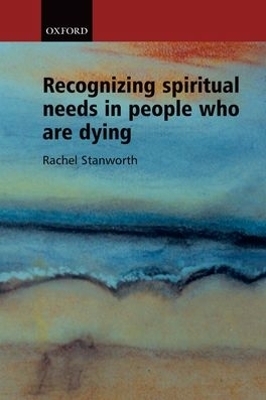
Recognizing Spiritual Needs in People who are Dying
Oxford University Press (Verlag)
978-0-19-852511-0 (ISBN)
Listening carefully to patients at the end of life is at the heart of good palliative care and this book provides a means of recognizing and talking about spiritual needs even when religious language is not used. The author refers to this as a 'language of spirit'. The book is based on interviews with patients who are dying and the language that they use to describe their experiences. It deals with death, dying, the experiences of patients and the relief of spiritual pain by looking closely at patient stories, drawings and behaviour.
The book explains why it is often easier to recognize than to explain spiritual issues. Part One explores the psychological, spiritual and theological interpretations of human experience. A detailed account is given of how the patients' own stories were collected. Drawing on a broad literature which is grounded in patients' words and deeds, Part Two introduces a non-religious 'language of spirit'. Illuminated by patient art, Part Three shows what patients use this language to 'say' about their situation and how it is mediated through various metaphors. Part Four suggests ways of responding positively to patients' spiritual needs.
Aimed primarily at palliative care specialists and specialist nurses, this book will also appeal to health care chaplains, pastoral support workers, theologians, social researchers, and psychotherapists.
'The numerous illustrations, given by patients comments as they tell their story, make this book a truly fascinating journey through an important area of end of life care.' Dame Cicely Saunders, OM, DBE, FRCP, Founder/President, St Christopher's Hospice, London
'The emphasis on allowing patients to speak for themselves is striking... the author has presented the topic in a sensitive and refreshing way... I think this book will be well-received and it will be an important contribution to the literature of palliative care.' Dr Odette Spruyt, Head of Pain and Palliative Care Department, Peter MacCallum Cancer Institute, East Melbourne, Australia
Rachel Stanworth is a trained nurse and a Doctor of Pastoral Theology. This book is based on research she conducted over three years in post as Chaplaincy Researcher at St Christopher's Hospice, London. She is also a member of the management advisory committee of The Befriending Network, a charity that trains, supports and supervises volunteers who befriend people with life-threatening or terminal illness.
Foreword ; Introduction ; PART ONE - UNDERSTANDING SPIRITUALITY - HOW FAR CAN STORY GO? ; 1. How stories create and disclose meaning ; 2. Spirituality and psychology: stories with differing limits ; 3. Stories in the 'listening': collecting data ; 4. A story in the making: data analysis and interpretation ; PART TWO - SPIRITUAL CONCERNS EXPRESSED IN NON-RELIGIOUS WAYS ; 5. Features of a 'language of spirit' ; PART THREE - NINE METAPHORS WAITING TO BE RECOGNISED - HOW SPIRITUALITY IS MEDIATED IN THE HERE AND NOW ; 6. Patients' sources of meaning and sense of self ; 7. Marginality and liminality - metaphors of the edge or the way? ; 8. Metaphors of control ; 9. Metaphors of letting go ; 10. Archetypal hero ; 11. Archetypal mother ; 12. Archetypal stranger ; 13. Recognising life's 'surplus of meaning' ; PART FOUR - IMPLICATIONS FOR SPIRITUAL CARE ; 14. Some inconclusive reflections
| Erscheint lt. Verlag | 18.12.2003 |
|---|---|
| Zusatzinfo | 8pp colour plates |
| Verlagsort | Oxford |
| Sprache | englisch |
| Maße | 154 x 231 mm |
| Gewicht | 442 g |
| Themenwelt | Religion / Theologie ► Christentum ► Kirchengeschichte |
| Religion / Theologie ► Christentum ► Pastoraltheologie | |
| Medizin / Pharmazie ► Medizinische Fachgebiete ► Onkologie | |
| Medizin / Pharmazie ► Medizinische Fachgebiete ► Palliativmedizin | |
| Medizin / Pharmazie ► Pflege ► Palliativpflege / Sterbebegleitung | |
| ISBN-10 | 0-19-852511-7 / 0198525117 |
| ISBN-13 | 978-0-19-852511-0 / 9780198525110 |
| Zustand | Neuware |
| Haben Sie eine Frage zum Produkt? |
aus dem Bereich


